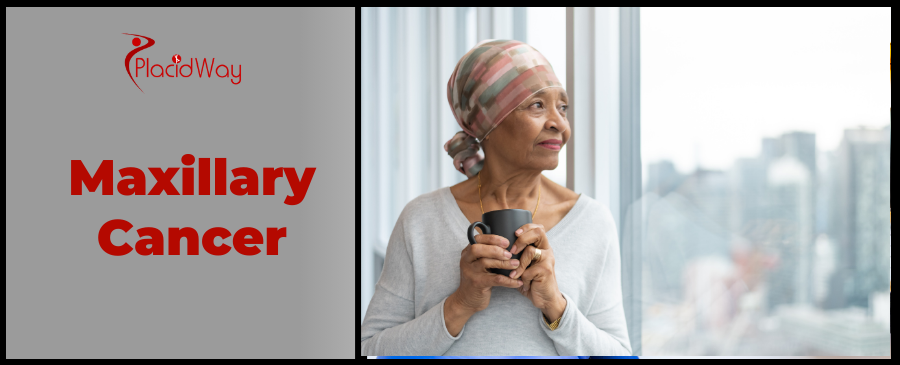
Finding Hope and Healing: Understanding Maxillary Cancer Treatment Options
A diagnosis of maxillary cancer can bring a wave of uncertainty and fear. This rare but serious condition affects the upper jaw, often extending into the paranasal sinuses. It's a journey that requires courage, informed decisions, and access to the best possible medical care. If you're searching for "maxillary sinus cancer treatment," "upper jaw cancer symptoms," or "affordable cancer care abroad," you're not alone. Many patients, like you, are exploring all avenues to find effective treatment, often looking beyond their borders for specialized expertise, advanced technologies, or more accessible options.
Maxillary cancer, also known as cancer of the maxillary sinus or upper jaw cancer, originates in the cells lining the maxillary sinuses, which are air-filled spaces located behind the cheekbones. While relatively uncommon, early detection and appropriate treatment are crucial for improving outcomes. Symptoms can be subtle initially, often mimicking common sinus issues, making awareness vital. Treatment typically involves a multidisciplinary approach, combining surgery (maxillectomy), radiation therapy, and chemotherapy, tailored to the specific stage and characteristics of the cancer.
For those navigating this complex diagnosis, understanding the disease, its symptoms, causes, and the full spectrum of treatment options is the first step towards recovery. In this comprehensive guide, we'll delve into everything you need to know about maxillary cancer, including how medical tourism can open doors to world-class care, advanced procedures, and potentially life-saving treatments that might be more accessible or affordable overseas. We'll explore questions like "what are the signs of sinus cancer?", "what is the best treatment for jaw cancer?", and "can I get good cancer treatment in another country?" to empower you with the knowledge needed to make the best decision for your health journey.
What are the warning signs and symptoms of Maxillary Cancer?
Recognizing the early signs of maxillary cancer can be challenging, as they often resemble less serious conditions like allergies or sinus infections. However, paying attention to persistent or worsening symptoms is crucial. Patients often search for "early symptoms of maxillary sinus cancer" or "how to tell if sinus pain is serious."
- Persistent Facial Pain or Numbness: Discomfort in the cheek, upper jaw, or around the eye that doesn't go away, or a feeling of numbness in the face, teeth, or upper lip.
- Nasal Symptoms: Chronic nasal obstruction or congestion on one side, frequent nosebleeds (epistaxis), or discharge with blood.
- Eye Problems: Bulging of one eye (proptosis), double vision, or persistent tearing.
- Dental Issues: Loosening of teeth, ill-fitting dentures, or pain in the upper teeth without an obvious dental cause.
- Facial Swelling or Asymmetry: Swelling in the cheek, upper jaw, or around the eye that creates an uneven appearance.
- Lumps or Masses: A palpable lump in the upper jaw or inside the mouth.
- Difficulty Opening Mouth: In advanced stages, the tumor might affect the muscles or nerves, leading to trismus.
If you experience any of these symptoms for an extended period, especially on one side, it's vital to consult a doctor. Early detection significantly improves treatment outcomes.
What causes Maxillary Cancer and who is at risk?
Patients often inquire about "causes of maxillary sinus cancer" or "risk factors for upper jaw cancer." While a direct cause isn't always identifiable, several factors are known to increase the risk:
- Occupational Exposure: Chronic exposure to certain industrial chemicals and dusts is a significant risk factor. This includes wood dust (especially hardwood), leather dust, textile dust, nickel dust, and fumes from chromium, isopropyl alcohol, and radium. Workers in furniture manufacturing, woodworking, boot and shoe manufacturing, and plating industries are particularly vulnerable.
- Smoking and Alcohol: Tobacco use (cigarettes, cigars, chewing tobacco) and heavy alcohol consumption significantly increase the risk of many head and neck cancers, including maxillary cancer. The combination of both is particularly dangerous.
- Human Papillomavirus (HPV) Infection: Certain strains of HPV, particularly HPV-16, are increasingly linked to some head and neck cancers, though its role in maxillary sinus cancer is still being researched.
- Chronic Sinusitis: While not a direct cause, chronic inflammation of the sinuses might be a contributing factor over many years, though this link is not as strong as occupational exposures.
- Age: The risk of maxillary cancer generally increases with age, most commonly diagnosed in people over 40.
- Radiation Exposure: Previous radiation therapy to the head and neck area for other conditions can increase the risk.
Understanding these risk factors can help individuals take preventive measures and be more vigilant about symptoms, especially if they have a history of exposure.
What treatment options are available for Maxillary Cancer?
When diagnosed with maxillary cancer, patients often ask, "how is maxillary cancer treated?" or "what is a maxillectomy procedure?" Treatment plans are highly individualized, determined by the cancer's stage, size, location, and the patient's overall health. A team of specialists, including head and neck surgeons, radiation oncologists, medical oncologists, and reconstructive surgeons, collaborates to create the best strategy.
The primary treatment modalities include:
- Surgery (Maxillectomy): This is often the cornerstone of treatment. A maxillectomy involves removing part or all of the maxilla (upper jawbone) affected by the cancer.
- Partial Maxillectomy: Removal of only a portion of the maxilla.
- Total Maxillectomy: Removal of the entire maxilla on one side.
- Radical Maxillectomy: Removal of the maxilla along with surrounding structures.
After tumor removal, reconstructive surgery is often necessary to restore facial appearance and function, which might involve using bone grafts, tissue flaps, or prosthetic devices (obturators).
- Radiation Therapy: Uses high-energy rays to kill cancer cells. It can be used:
- After surgery (adjuvant): To eliminate any remaining cancer cells and reduce recurrence risk.
- Before surgery (neoadjuvant): To shrink large tumors, making them easier to remove.
- As primary treatment: For patients who cannot undergo surgery or for early-stage cancers.
Advanced techniques like Intensity-Modulated Radiation Therapy (IMRT) or Proton Therapy are often used to precisely target the tumor while sparing healthy surrounding tissues.
- Chemotherapy: Uses drugs to kill cancer cells throughout the body. It may be used:
- Concurrently with radiation (chemoradiation): To enhance the effectiveness of radiation therapy.
- Before surgery (neoadjuvant): To shrink tumors.
- For advanced or metastatic cancer: To control disease spread.
- Targeted Therapy and Immunotherapy: Newer treatments that specifically target cancer cells based on their unique genetic mutations or boost the body's immune system to fight cancer. These are often used for advanced or recurrent cases.
The choice of treatment is a critical discussion between the patient and their medical team, weighing efficacy against potential side effects and long-term quality of life.
Who is an eligible candidate for Maxillary Cancer treatment?
When patients search for "who can get maxillary cancer treatment" or "eligibility for maxillectomy," they are seeking to understand if they qualify for specific interventions. The eligibility for Maxillary Cancer treatment is determined by a comprehensive evaluation, considering several key factors:
- Cancer Stage and Extent: Early-stage cancers (Stage I, II) are often excellent candidates for primary surgical resection. More advanced stages (Stage III, IV) may require multimodal therapy (surgery + radiation + chemotherapy) and complex reconstructive procedures.
- Overall Health and Comorbidities: Patients must be in sufficiently good health to withstand the rigors of surgery, anesthesia, and subsequent therapies like radiation or chemotherapy. Pre-existing conditions (heart disease, diabetes, lung issues) are carefully assessed.
- Age: While age itself isn't a strict barrier, very elderly or frail patients may have limited tolerance for aggressive treatments. However, healthy older adults can undergo successful treatment.
- Nutritional Status: Good nutritional status is vital for recovery and healing, especially after extensive oral or facial surgery.
- Patient's Wishes and Goals: An open discussion about treatment goals, expected outcomes, and potential impact on quality of life is essential. Some patients may opt for palliative care if curative treatment is deemed too burdensome or unlikely to succeed.
- Availability of Reconstructive Options: For extensive resections, the feasibility of immediate or delayed reconstruction plays a role in the overall treatment plan.
A thorough medical workup, including imaging (CT, MRI, PET scans), biopsies, and consultations with a multidisciplinary team, will determine the most appropriate and feasible treatment plan for each individual.
What does recovery from Maxillary Cancer treatment involve?
Patients often search for "maxillary cancer surgery recovery time" or "life after maxillectomy." Recovery from maxillary cancer treatment can be a long and challenging journey, varying greatly depending on the extent of the surgery, the use of radiation and chemotherapy, and the individual's healing capacity. It typically involves several phases:
- Immediate Post-Operative Period (Hospital Stay):
- Typically 1-2 weeks, possibly longer for complex reconstructions.
- Pain management is crucial.
- Patients may have feeding tubes, drains, and breathing tubes initially.
- Early mobilization is encouraged.
- Initial Home Recovery (Weeks 1-8):
- Fatigue is common and can last for months.
- Eating and speaking may be challenging, requiring a soft diet or continued use of feeding tubes.
- Wound care and management of surgical sites or prosthetic obturators.
- Swelling and bruising gradually subside.
- Rehabilitation and Long-Term Adaptation (Months to Years):
- Speech Therapy: To help regain clear speech, especially if vocal cords or palate were affected.
- Swallowing Therapy: To improve eating and drinking, and prevent aspiration.
- Physical Therapy: If neck dissection was performed, to improve shoulder and neck mobility.
- Prosthodontics/Dental Rehabilitation: To fit and maintain obturators (prostheses for the palate), dentures, or dental implants.
- Psychological Support: Dealing with facial changes, altered function, and the emotional impact of cancer requires significant psychological and social support. Support groups can be invaluable.
- Nutritional Support: Many patients benefit from ongoing dietary counseling.
The goal of recovery is not just to heal physically but to regain as much function and quality of life as possible, often with the support of a dedicated rehabilitation team.
What are the potential risks and side effects of Maxillary Cancer treatment?
Understanding the "risks of maxillectomy" or "side effects of radiation for sinus cancer" is crucial for informed decision-making. The aggressive nature of maxillary cancer often necessitates treatments with significant potential side effects, which can be short-term or long-term:
Surgical Risks (Maxillectomy):
- Bleeding and Infection: Standard surgical risks.
- Nerve Damage: Can lead to facial numbness, weakness, or paralysis, affecting sensation, eye movement, or facial expression.
- Fistula Formation: An abnormal connection between the mouth and nasal cavity or sinuses, leading to leakage.
- Disfigurement and Facial Asymmetry: Removal of bone and tissue can significantly alter facial appearance, often requiring reconstructive surgery or prosthetics.
- Difficulty with Eating and Speaking: Changes in the oral and nasal cavity can impact chewing, swallowing, and speech articulation.
- Vision Changes: If the eye or optic nerve is affected, vision loss or double vision can occur.
Radiation Therapy Side Effects:
- Oral Mucositis: Painful inflammation and sores in the mouth and throat.
- Dry Mouth (Xerostomia): Permanent damage to salivary glands, leading to chronic dryness, difficulty swallowing, and dental issues.
- Taste Changes: Food may taste different or bland.
- Skin Changes: Redness, peeling, and irritation in the treated area.
- Fatigue: Common and often debilitating.
- Osteoradionecrosis: In rare cases, radiation can damage jawbone tissue, leading to bone death.
Chemotherapy Side Effects:
- Nausea and Vomiting: Often managed with anti-emetic medications.
- Fatigue: Profound tiredness.
- Hair Loss: Temporary hair thinning or loss.
- Neutropenia: Low white blood cell count, increasing infection risk.
- Neuropathy: Nerve damage causing numbness or tingling.
A comprehensive team approach helps manage these side effects and improve the patient's quality of life throughout and after treatment.
How much does Maxillary Cancer treatment cost worldwide?
One of the most pressing concerns for patients and their families is the "cost of maxillary cancer treatment" or "affordable cancer treatment overseas." The cost can vary significantly based on the country, the complexity of the procedure (e.g., partial vs. total maxillectomy with reconstruction), the length of hospital stay, the need for radiation and chemotherapy, and the hospital's reputation and technology.
| Country | Estimated Cost Range (USD) for Comprehensive Treatment* | Notes on Value |
|---|---|---|
| United States | $70,000 - $200,000+ | World-class expertise and technology, but highest costs. Insurance essential. |
| United Kingdom | $50,000 - $150,000+ | High-quality care, but also high costs for private treatment. |
| Germany | $40,000 - $100,000+ | Excellent medical infrastructure, slightly lower costs than US/UK. |
| Turkey | $25,000 - $60,000 | Growing medical tourism hub with modern facilities and experienced surgeons. Significant savings. |
| India | $20,000 - $55,000 | Globally recognized for affordable, high-quality oncology care, especially in metro cities. |
| Mexico | $20,000 - $50,000 | Convenient for North American patients, offering competitive prices and good quality. |
| Thailand | $25,000 - $55,000 | Excellent private hospitals, often with international accreditation and highly skilled staff. |
*These are estimated ranges and can vary widely. They typically include surgery, hospital stay, and initial follow-up, but may not include full radiation/chemotherapy courses or extensive reconstruction. Always obtain a personalized quote.
These figures highlight why many patients consider medical tourism for Maxillary Cancer treatment, especially when facing high out-of-pocket costs or long waiting lists in their home countries.
Why consider Maxillary Cancer treatment abroad for better care or value?
When grappling with a cancer diagnosis, exploring all options is natural. Many patients search for "international cancer treatment" or "benefits of medical tourism for oncology." The decision to seek Maxillary Cancer treatment abroad is often driven by several compelling factors:
- Cost Savings: As seen in the table above, the cost difference can be substantial. For uninsured or underinsured patients, or those with high deductibles, medical tourism makes life-saving treatments affordable. For instance, a complex maxillectomy with reconstruction that costs $150,000 in the US might be available for $40,000 in India or Turkey. This isn't about "cheap" care, but about comparable quality at a lower price point due to different economic structures.
- Access to Specialized Expertise: Some countries and hospitals specialize in complex head and neck oncology, offering highly experienced surgeons and multidisciplinary teams who perform these procedures regularly. This is especially true for rare cancers like maxillary cancer.
- Advanced Technology and Techniques: Many international medical centers boast state-of-the-art equipment, including robotic surgery, advanced radiation therapies (like proton therapy), and innovative reconstructive techniques that might not be readily available or covered by insurance at home.
- Reduced Waiting Times: In countries with public healthcare systems, waiting lists for specialized surgeries can be long, delaying critical treatment. Medical tourism often provides quicker access to care.
- Confidentiality and Privacy: Some patients prefer to seek treatment away from their home communities for privacy reasons.
- Personalized Care and Patient Experience: Many international hospitals cater specifically to medical tourists, offering concierge services, language support, and a more personalized patient experience.
Considering treatment abroad is a strategic move to secure the best possible outcome for your health, often with financial relief and expedited care.
Which international destinations offer the best value and quality for Maxillary Cancer treatment?
Patients often ask, "where is the best place for cancer treatment overseas?" or "which countries have advanced cancer care at low cost?" Several countries have emerged as leaders in medical tourism for complex procedures like Maxillary Cancer treatment, balancing quality and cost effectively:
- India: Renowned for its JCI-accredited hospitals, highly skilled oncologists and surgeons, and state-of-the-art technology. Major cities like Delhi, Mumbai, Chennai, and Bangalore offer comprehensive cancer centers providing excellent care at significantly lower costs. India is a top choice for patients seeking advanced, affordable cancer treatment.
- Turkey: With its strategic location and investment in healthcare infrastructure, Turkey has become a major medical tourism destination. Hospitals in Istanbul and Ankara offer cutting-edge oncology departments, often with European-trained specialists and competitive pricing.
- Mexico: Particularly appealing to North American patients due to proximity, Mexico provides high-quality healthcare facilities in cities like Tijuana, Monterrey, and Mexico City. Many doctors are US-trained, and hospitals meet international standards, providing an accessible and affordable option.
- Thailand: Known for its luxurious private hospitals, world-class medical professionals, and excellent patient care experience. Bangkok is a hub for medical tourism, offering advanced cancer treatments and comprehensive rehabilitation services in a welcoming environment.
- South Korea: While potentially more expensive than other Asian options, South Korea offers some of the most technologically advanced medical care globally, with highly specialized cancer centers and exceptional success rates.
When selecting a destination, research hospitals' international accreditations (like JCI), specialist qualifications, patient reviews, and the comprehensiveness of their treatment packages.
What should I expect when traveling overseas for Maxillary Cancer treatment, and how can I ensure quality?
Preparing to travel for Maxillary Cancer treatment can seem daunting, but with proper planning, it can be a smooth process. Patients often search for "traveling for cancer surgery tips" or "medical tourism safety." Here’s what to expect and how to ensure you receive high-quality care:
What to Expect:
- Initial Consultation & Evaluation: You'll likely share your medical records (scans, biopsy reports) for a remote consultation with the international medical team. They will review your case and provide a proposed treatment plan and cost estimate.
- Travel Arrangements: A medical tourism facilitator like PlacidWay can help with visas, flights, accommodation, and local transportation. Many hospitals offer dedicated international patient services.
- Pre-Treatment Tests: Upon arrival, you'll undergo thorough diagnostic tests to confirm the diagnosis and stage, ensuring the treatment plan is appropriate.
- Treatment and Hospital Stay: Expect a hospital stay ranging from a few days to weeks, followed by a period of local recovery before being cleared to travel home.
- Language and Cultural Support: Most medical tourism hospitals have staff fluent in English and other major languages, and they are accustomed to serving international patients.
- Follow-up Care: Discuss follow-up care and rehabilitation needs, and how they can be managed upon your return home.
How to Ensure Safety and Quality Abroad:
- Choose Internationally Accredited Hospitals: Look for accreditations from organizations like Joint Commission International (JCI), which signify adherence to global quality and patient safety standards.
- Verify Doctor Credentials: Research the surgeon's experience, certifications, and affiliations. Many top international surgeons have Western training or affiliations.
- Understand the Treatment Plan: Ensure you have a clear, written treatment plan, including all procedures, potential risks, expected outcomes, and post-operative care.
- Get a Detailed Cost Breakdown: Avoid hidden fees by getting a comprehensive quote that outlines all costs, including hospital stay, surgery, medications, and follow-up.
- Consider Medical Tourism Facilitators: Reputable companies like PlacidWay specialize in connecting patients with trusted international providers, streamlining the entire process and providing an extra layer of vetting.
- Read Patient Testimonials: Look for reviews and success stories from other international patients who have undergone similar treatments.
- Plan for Aftercare: Discuss how you will manage post-treatment rehabilitation and follow-up once you return to your home country.
By taking these steps, you can confidently pursue high-quality Maxillary Cancer treatment abroad.
Take the Next Step with PlacidWay
Ready to explore treatment options abroad? Discover top clinics, compare prices, and get a free quote tailored to your needs with PlacidWay.
Cancer Treatment Abroad, Breast Cancer, Lung Cancer





.png)
.png)
.png)
.png)

Share this listing